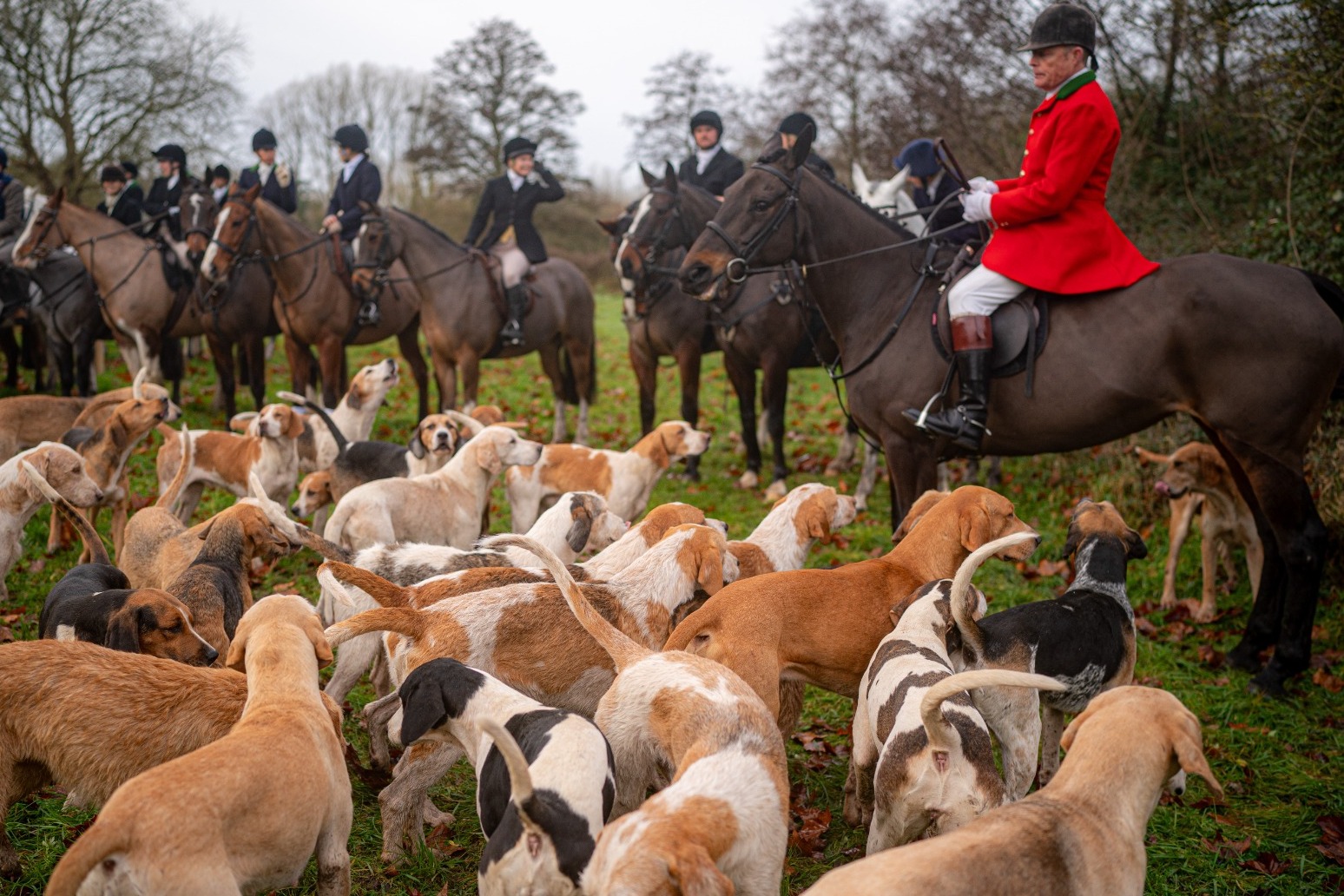
Government’s pledge to ban trail hunting in spotlight as Boxing Day hunts meet
The Government is under pressure over its manifesto pledge to ban trail hunting as hunts gather for the traditional Boxing Day meet.
Anti-hunting campaigners are urging them to deliver on the promise to ban trail hunting – a practice in which a scent is laid across the countryside for hounds and riders to follow as an alternative to banned fox hunting, but which has been criticised as a “smokescreen” for illegal activity.
But the Countryside Alliance has warned further changes to the law are “completely unjustified”, as people were carrying out a legitimate, legal activity that brought the rural community together.
Tim Bonner, the alliance’s chief executive, also said the issue of trail hunting was irrelevant to most people and it would be “extraordinary” for Labour to focus on it given the poor state of relations with rural communities.
Labour, which introduced the original ban on hunting with dogs in 2004, pledged in its manifesto this year to ban trail hunting, as part of what it says are measures to “improve animal welfare”.
A spokesperson for the Environment Department (Defra) confirmed the Government planned to ban trail hunting, telling the PA news agency: “This government was elected on a mandate to introduce the most ambitious animal welfare plans in a generation and that is exactly what we will do.
“We are committed to a ban on trail hunting, which is being exploited as a smokescreen to cruelly kill foxes and hares.”
The League Against Cruel Sports said figures compiled by its intelligence team found that since the beginning of August, 186 foxes were reported being pursued by hunts and there were 220 reports relating to suspected illegal hunting incidents.
There were also 553 reports of “hunt havoc”, in which hounds caused disruption such as chasing other wild animals or pets, worrying livestock or causing traffic incidents, or disturbing the public, the organisation said.
Emma Judd, head of campaigns at the League Against Cruel Sports, said: “It’s 20 years since the Hunting Act was passed but, since then, figures we compile consistently suggest hunts still chase and kill foxes as they did before the ban.
“Hunts may claim they are following a pre-laid animal scent trail, known as trail hunting, but this has been shown to be nothing but a smokescreen to conceal old-fashioned illegal hunting.”
She said trail hunting and loopholes in the Hunting Act made it “all but impossible” to enforce the law, and called for the Government to strengthen the legislation and introduce custodial sentences for those hunting wild animals with dogs, and to set out a timetable for doing so.
Dan Norris, Labour MP for North East Somerset and Hanham and chairman of the League Against Cruel Sports, urged ministers to “listen to the majority view, including in rural areas, to close the legal loopholes that allow needless cruelty to animals, and implement a proper ban on hunting once and for all”.
But Mr Bonner accused parts of the Labour Party of the politics of “perceived class and prejudice” and said: “It’s very sad that we may be going back to a point where we have to waste even more parliamentary time on this irrelevant issue.
“If they are claiming that somehow this law needs to be changed to address illegal behaviour, then it needs to be very carefully thought through, and any proposals are brought forward do just need to address that.
“Because what there can’t be any any case for is stopping people going into the countryside with a pack of hounds or dogs, and carrying out a completely benign activity, which is what hunts are doing.”
He said there were 12,000 hunting days carried out each year which were legal and legitimate.
While he said moves to require hunts to lay non animal-based scents and bring in a “recklessness” element to the offence would be survivable for most hunts, he warned Labour against “opening Pandora’s box” by revisiting the legislation, as he said it could become a toxic political battle.
In the wake of widespread anger with Labour in rural communities over issues such as changes to inheritance tax for farm businesses and an acceleration of the phaseout of farming subsidies in favour of environmental payments, Mr Bonner also said it would be extraordinary to push a ban.
“Given where the government is in its relationship with the countryside already, frankly it would seem extraordinary that they’d want to double down on an issue which really doesn’t matter.”
While there are hundreds of jobs supported by hunting, it is a relatively niche activity, he said, but added it plays a key role in parts of rural Britain where farming is tough and mental health and loneliness are big issues.
“It’s one of those elements that brings the rural community together and to remove that through an act of spite, if that was to happen, would be something which I think people would react extremely badly to,” he said.
Joe Emmett, master and huntsman of the South Devon Hunt, said: “The hunt plays an important role in our local community and meets like Boxing Day are the perfect opportunity for locals and visitors to the area to come together.”
The League Against Cruel Sports said polling earlier this year showed more than three quarters (76%) of the British public supported strengthening the Hunting Act, but the Countryside Alliance pointed to a survey over the weekend of more than 2,000 people in which just 5% put it in their top three issues for voting in the next election.
Published: by Radio NewsHub